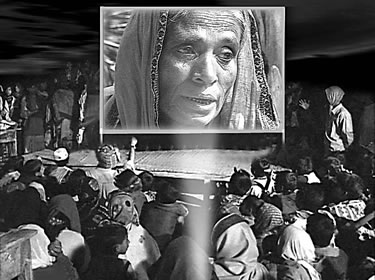Muktir
Kotha
(Words of Freedom)

This historic film tells the true story of musicians travelling through
the refugee camps and zones of war during the Liberation War in
1971. The film blends documentary and fictional genres in a musical
structure to tell the story of the birth of a nation and the ideals
of secularism and tolerance on which it was founded.
The film makers combined footage shot by American
film maker Lear Levin in 1971 with international archival material
to create this unique film (dir Tareque & Catherine Masud,
India 1995, 78 mins, Bengali, with English subtitles) plus Words
of Freedom (Muktir Kotha).
In some ways a follow-up to and critique of Song
of Freedom, the film follows a group of projectionists, who travelled
Bangladesh from 1996-8, showing films about the 1971 war. These
documentary images rekindled painful memories, prompting audiences
to speak of the dreams they'd had for their country, their present
frustrations and new expectations. At times the open-air projection
spaces would be spontaneously transformed into a concert of liberation
songs. Through these interactive shows, the 'teachers' who had
come from the city to spread the spirit of the war through their
films, came to 'relearn' the wider history of the liberation struggle
from their audiences. The struggle did not end in 1971 as the people
who risked their lives and sacrificed everything during the war
were still living in poverty and despair. The harvest of the war
they had fought was reaped by the rich.
Words of Freedom is a film about this continuing
liberation struggle, an unwritten history which is not to be found
in any textbook. The film documents the unheard stories of religious
and ethnic minorities, women, and other marginalized people in
their own voices. It is a record of the ways in which ordinary
people fell victim to genocide, rape and other atrocities and also
how they fought back with whatever means they had. It is a testament
to the struggle still raging in the countryside, a struggle for
a more just and democratic society that was the dream of liberation.
ABOUT THE DIRECTOR
Catherine
Masud is an American filmmaker who lives in Dhaka. She
is a co-director of the film and of the television company Audiovision.
She and her Bangladeshi husband, Tareque, are committed to making
creative documentaries that project a different image of the
people and issues of South Asia. Her credits include the following:
Muktir Gaan, Voices of Children and In the Name of Safety. Catherine
also works as a multi-media consultant where she pursues her
special interests in computer-based audio, video and interactive
media production.
Tareque
Masud has been actively involved in the alternative
film society movement since the mid-1970s. He is a founding member
of the Short Film Forum, the primary forum for alternative filmmakers
in Bangladesh, and in 1988 served as Coordinator of the First
International Short Film Festival held in Dhaka. His documentary
Muktir Gaan was a critical and commercial success, and won the
National Award for best documentary, as well as a Special Jury
Prize at Film South Asia '97, Kathmandu. His other credits include
The Inner Strength, The Conversation and Voices of Children.
|
Bangladesh,
1999
80 min
Beta Color
Bangla
Subtitled
|
Direction
Tareque Masud
Catherine Masud
Camera
Mishuk Munier
Editing
Catherine Masud
Associate Editor
Fauzia Khan
Production
Audiovision
Contact
Audiovision
ctmasud@citechco.net
|
|

